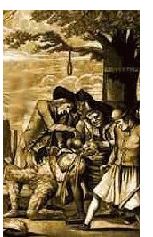American Patriot Judge Charles Lynch
 Although the meaning is probably universally known, the origin of the term 'to Lynch' seems to have been almost lost in time,
probably because it conjures up too horrific a scene to be compatible with the so called 'glorious' cause.
Although the meaning is probably universally known, the origin of the term 'to Lynch' seems to have been almost lost in time,
probably because it conjures up too horrific a scene to be compatible with the so called 'glorious' cause.
In the 18th century American hinterland, rouge settlers used to just brutally take over Indian land and this was most likely the case for a certain Lynch clan, who settled either side of the Staunton River in the Blue Ridge foothills of the Appalachian Mountains, western Virginia.
Even in 1774 the nearest courthouse was over two hundred miles away when Charles son of John Lynch decided to join the Virginia legislature to serve as a Justice of the Peace in Pittsylvania County.
In this role he had to deal with horse thieves and got used to handing out harsh punishments, as the accused could either receive 39 lashes, be strung up by the thumbs or hung.
During the American Revolution matters had became tense between the colonists, with the Loyalists under constant threat by intimidating gangs of Patriots, while Loyalists in turn pointed out to the British the illegal activities of patriots and revealing the lairs of smugglers.
Charles Lynch an ardent patriot, was active in equipping and mobilizing the insurgency, therefore no doubt stealing horses from Loyalists, so when Sir Henry Clinton's force convincingly took Charleston in April 1780 this generated much excitement in the local Loyalists who then started to prepare to join his army.
At least half the residents in Southside Virginia were considered to be 'Tories' and were then an increased threat to the Patriots, so they decided to act first, Charles Lynch used his position to check records to identify suspected Loyalists and in fact found them so numerous they were going to be easy to find. Armed with this information he self-appointed himself jury and sent out gangs of Patriot zealots to systematically visit the homesteads of these 'suspects'.
Under the guise of the law these mobs claimed that Loyalists were guilty of the heinous and felonious crime of treason, for which anyone likely to be a threat to them, was arbitrarily dragged out of their homes and strung up.
If the suspect was known to have been wealthy he was considered a Loyalist and fined thousands of pounds under the threat of lynching, but only to be then lynched by them anyway.
This one sided situation was mainly because Patriots were used to organising themselves as generally contemptuous of British laws considering them oppressors, whereas the Loyalists would look to the law, but were at a servere disadvantage when the law was being abused by a Judge and bands of lowlife bigots.
These days the remaining focus of these atrocities is at Charles Lynch's former home at Green level (now Avoca) where hanging may have taken place from a walnut tree, the stump of which still remains, but a plaque has been placed there stating that no one was hung by Charles lynch on that spot. This may or may not be actually true, but it's inference is at least deceiving if not out right laughable.
As this statement is made ridiculous, by the fact that lynching was still being carried out in the south and mid United States until well into the 20th century e.g.Ku Klux Klan and that parts of Virginia went from having a majority of Loyalists to that of virtually none, meaning that hundreds if not thousands of Loyalists were lynched.
Also after the war in the new United States, Laws were passed to allow no recourse against those who carried out the lynchings, either in Virginia or at any other location. Obviously no records exist, long since covered over by American authorities and historians, but Charles Lynch was exonerated by the state legislature and is considered to have an untarnished reputation as a patriot in his relentless quest to 'expose' Loyalists!
It was not until the 20th century that America developed a revulsion against lynching, so it's hard to find any unsanitized accounts of the notorious despot patriot Judge Lynch.
